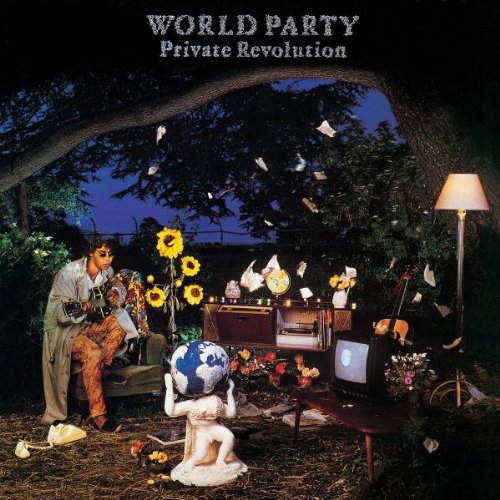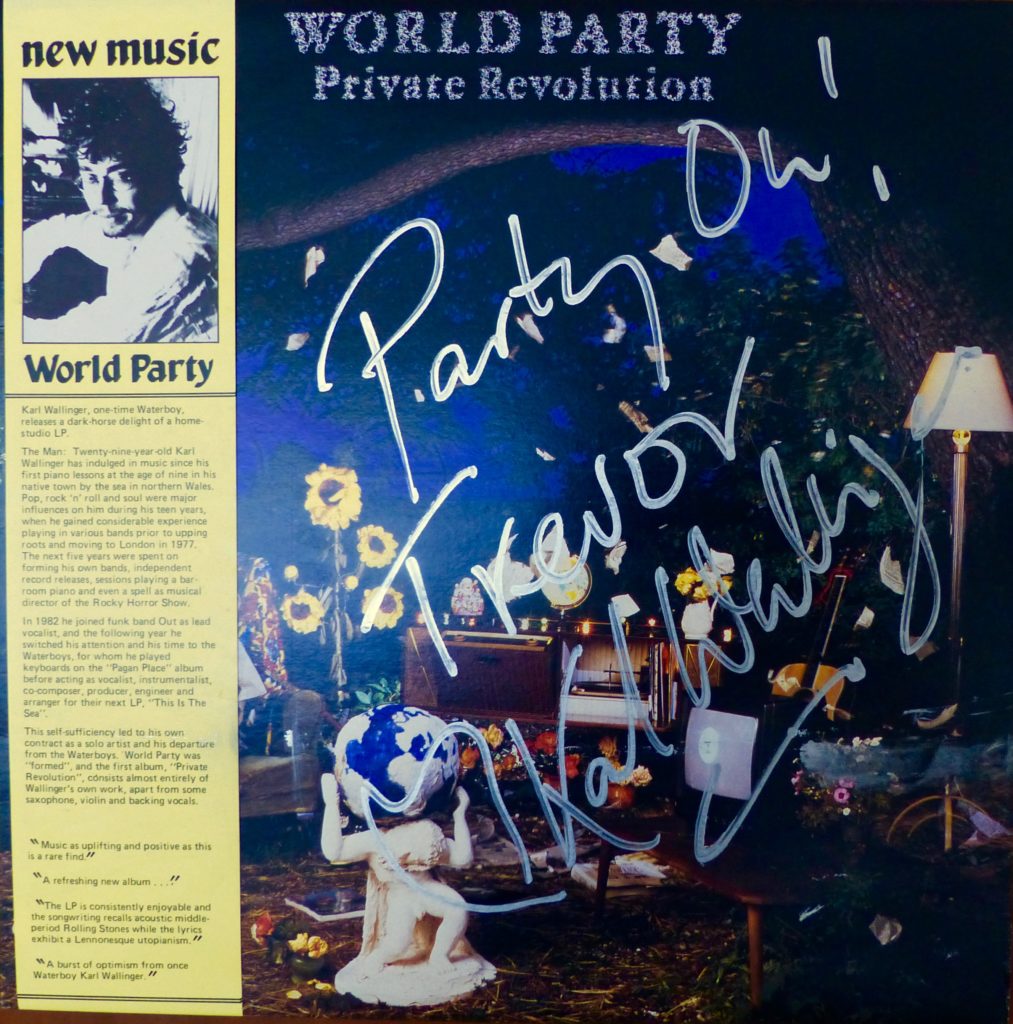 It’s 1986 and my career as a radio broadcaster is underway having just landed my second job at a regional station on the south coast of NSW. At the time of joining that station the debut single by a new artist called World Party was released. Ship Of Fools went on to become a Top 5 hit in Australia (bigger here than anywhere else in the world) and the song instantly became a personal favourite. Having now clocked up over 30 years in broadcasting I’ve played the song countless times over my career and on many, many other occasions in my own time. I still never tire of listening to it.
It’s 1986 and my career as a radio broadcaster is underway having just landed my second job at a regional station on the south coast of NSW. At the time of joining that station the debut single by a new artist called World Party was released. Ship Of Fools went on to become a Top 5 hit in Australia (bigger here than anywhere else in the world) and the song instantly became a personal favourite. Having now clocked up over 30 years in broadcasting I’ve played the song countless times over my career and on many, many other occasions in my own time. I still never tire of listening to it.
World Party is essentially a solo project for Karl Wallinger, who’d left The Waterboys to do his own thing just after they’d scored a major hit the previous year with The Whole Of The Moon. Karl co-wrote Don’t Bang The Drum with Mike Scott on This Is The Sea (his last album with The Waterboys), and while Karl did get some production and arranging credits for that album clearly it was Mike’s band, not Karl’s and the man needed to spread his creative wings.
When Ship Of Fools broke through I went out and bought the Private Revolution album straight away. I wasn’t disappointed.
The record is an interesting musical hybrid of folk, 60’s pop and the instrument of the day – the synthesiser. Strangely it all works together seamlessly. Karl Wallinger is one of those musical boffins who loves tinkering away in the studio playing with his toys and technology to fulfil his creative vision. And while there are guest musicians who make appearances on the album like Sinead O’Connor and Steve Wickham (who would afterwards go on to join The Waterboys), the majority of the credits like “Millenium Mills” on piano and “Ahmed Gottlieb” on sitar and tabla are just humorous pseudonyms designed to create the sense of a bigger World Party (or possibly a bigger revolution).
The prodigious Mr Wallinger is more than just a technically proficient multi instrumentalist, as a songwriter he has a classic tunesmith’s sense of melody combined with a consuming interest in the liberal leanings of the great folk artists. No surprise then that his musical heroes extend from The Beach Boys and The Beatles to Bob Dylan and Neil Young. But there are also soul and funk elements to his music too, some of which can be attributed to his admiration of artists like Sly Stone and Prince.
The title Private Revolution was a reference to Karl’s new found musical freedom creating this album in his home studio: “If you want a revolution baby there is nothing like your own” – all you needed to do was “Revolutionise at home”. But the wider implications, as are often the case with Karl, were his ecological concerns to set the planet free. The synth arrangement with the funky guitar accompaniment sounds like something straight out of Paisley Park with a Jagger like vocal. If that makes it sound like a cheap knock off it isn’t, Karl Wallinger openly wears his influences on his sleeve but in the process manages to create a sound that is very much his (or World Party’s).
Recording a solo album in your own studio in the midst of the “me” generation might have been indicative of the times, though the album’s environmental concerns were out of step with the “greed is good” era which may not have helped its cause. Still, a great song is a great song regardless of the lyrical content – even if Ship Of Fools warned that “avarice and greed are going to drive you over the endless sea”. If anything Karl Wallinger was ahead of the curve with his concerns about consumer excess and global ruin – within a few short years environmental activism had turned to populism with the likes of Sting wanting to save the Amazon and Bruce Cockburn finding a resurgence in his career with If A Tree Falls.
My favourite track on the album is All Come True. Underpinned by a driving drum beat and bass line groove the song features a host of percussive instruments drifting in and out of play, along with noodling funky guitar lines and a swirling organ. It’s the kind of soundscape that makes it perfect for a highway mix tape.
Coming off that groove the album takes an eclectic shift as Wallinger gives a nod to the Celtic roots of his recent Waterboys past with the Irish jig of the Dance Of The Hoppy Lads, before settling into the atmospheric charms of It Can Be Beautiful Sometimes to close out side one.
The opening three songs on the second side move into Dylan territory with The Ballad Of The Little Man sounding like something from Highway 61 Revisited. With an Al Kooper like organ the song warns of the perils of succumbing to that sinister voice within us all:
He tears up all the countryside
Stops when he should begin
Drowns when he tries to walk on water
But he never learns to swim
He’s an animal but he thinks he’s God
Gets him mixed up with HIM
And we’re all at the mercy of the little man within
Later in the song Karl also sneaks a cute reference to The Who into the lyric too:
Then you have just been fooled again
(Who said we won’t get fooled again?)
By the little man within
Hawaiian Island World follows with its countrified Hawaiian guitar delivered in a Dylanesque vocal style and then Karl serves up a beautiful rendition of Bob’s All I Really Want To Do.
The song World Party is a slice of 60’s soul with a rousing chorus that would make it an obvious album closer, but Karl comes back for one more bite of the cherry with the fabulous It’s All Mine. It’s a fantastic vocal driven by his frustration at the state of the world. The lyric claims ownership saying “it’s all my own fault” but like much of this album the overriding message is about taking action, and to do that we all individually have to take responsibility for the situation. As Einstein said: “The world is a dangerous place, not because of evil, but because of those who look on and do nothing”.
An amusing sideline to this album is that when I bought my copy of Private Revolution it included a narrow record company promo sleeve slipped over the cover with a brief bio introducing this mysterious new artist, accompanied by a few cheesy unattributed “quotes” like:
“A refreshing new album”,
“Music as uplifting and positive as this is a rare find”,
And my fave:
“The LP is consistently enjoyable and the songwriting recalls acoustic middle-period Rolling Stones while the lyrics exhibit a Lennonesque utopianism”
Really? Who wrote this stuff? The record company’s accountant? Despite their best intentions I don’t think they were doing World Party any favours. When Karl autographed the record years later he was bemused by the blurb – it was the first time he’d seen it.

Didn’t this include a DVD so you could wAtch it. I’m trying to replace mine and want to make sure I’m getting to watch as it plays
Hi Denise, not that I’m aware of, but if you find a copy let me know!